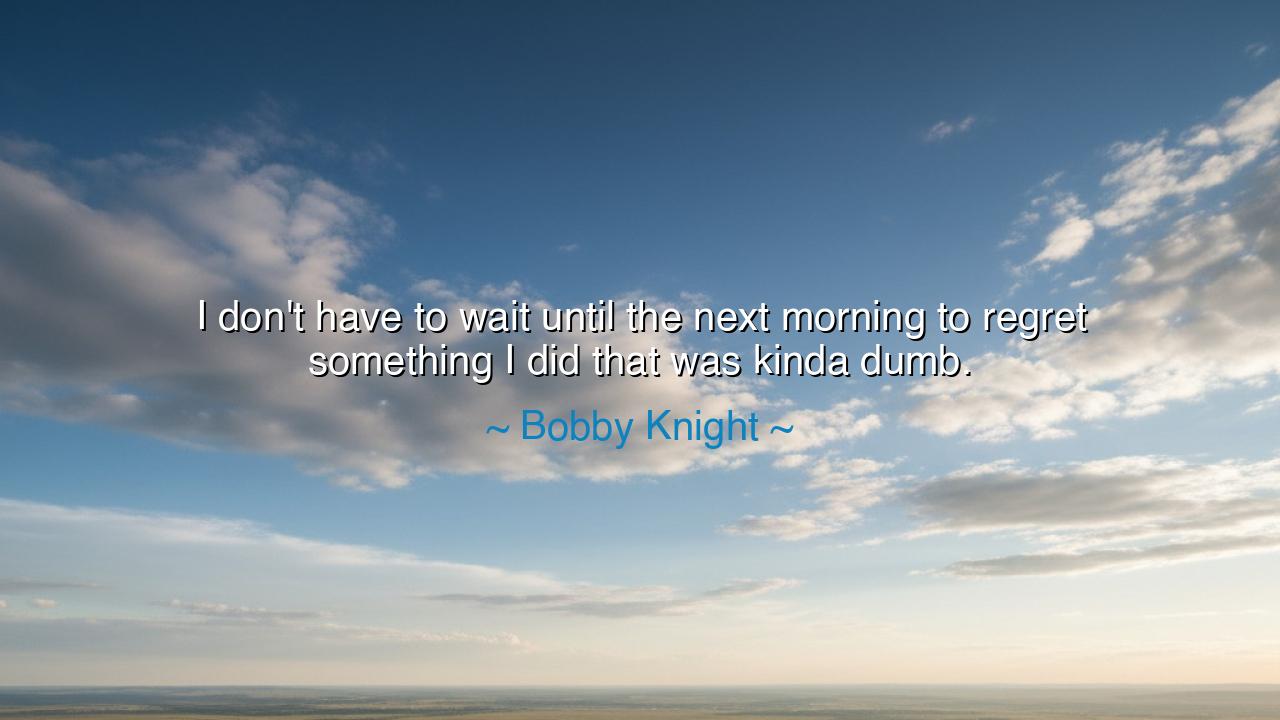
I don't have to wait until the next morning to regret something
I don't have to wait until the next morning to regret something I did that was kinda dumb.






The words of Bobby Knight, fierce coach and uncompromising spirit, cut with blunt honesty: “I don’t have to wait until the next morning to regret something I did that was kinda dumb.” At first glance, it may sound like humor, a self-deprecating quip. But within this confession is the essence of wisdom born from fire: the recognition of human imperfection, the immediacy of conscience, and the courage to admit fault without delay.
He speaks of regret, that shadow which follows every rash word and reckless deed. Many discover their missteps only after time has cooled their passions, waking the next morning with the sting of memory. But Knight, known for his temper and his unflinching ways, acknowledges that his awareness is swifter. His regrets come not delayed, but instant—like sparks from steel striking stone. It is as though his inner judge sits close, ready to remind him, even before the dust of anger has settled.
This is not weakness, but strength. To recognize error quickly is to shorten the path back to wisdom. The ancient philosophers taught that the unexamined life is no life at all; and Knight’s words reflect that examination does not always wait for quiet reflection at dawn. Sometimes it bursts forth in the very heat of the moment, teaching us even as we stumble. Regret, though painful, becomes a teacher—swift, stern, and merciful, if only we listen.
History offers a mirror in the story of Alexander the Great, who in a drunken rage struck and killed his loyal general Cleitus. Even before the wine had left his lips, Alexander was pierced with regret. He needed no morning light to see his folly. His anguish was immediate, his conscience burning him alive. Though his empire remained vast, that act weighed heavily on his soul, proving that the greatest victories can be undone by a single unguarded moment.
Bobby Knight’s words also remind us of the importance of self-awareness. Many hide from their mistakes, excusing them until time blurs their sharpness. But Knight admits openly that he knows when he has erred. To confess this, even in jest, is a mark of wisdom. For the one who admits his folly is already greater than the one who denies it, even when caught. This humility is a shield against pride, and pride is the ruin of many who rise to power.
The lesson is clear: learn to recognize your errors swiftly, and act upon that recognition. Do not let arrogance or delay harden your heart. Apologize quickly when you wound another. Reflect quickly when you misstep. The sooner you own your fault, the sooner you are free from its chains. To wait until tomorrow is to waste the gift of today’s correction.
Therefore, children of the future, remember this: do not fear regret, but embrace it as a guide. Let your conscience speak not in whispers delayed, but in the thunder that comes at once. Act upon its voice. For it is far better to stumble and rise quickly than to fall and remain blind until morning. The wise man is not the one who never errs, but the one who repents swiftly and learns deeply.
Thus, Bobby Knight’s candid remark, simple and rough, becomes an enduring truth: awareness of one’s own folly is the first step toward greatness. If you can regret in the moment, you can also change in the moment. And that is the power that turns failure into strength, and error into wisdom.






AAdministratorAdministrator
Welcome, honored guests. Please leave a comment, we will respond soon